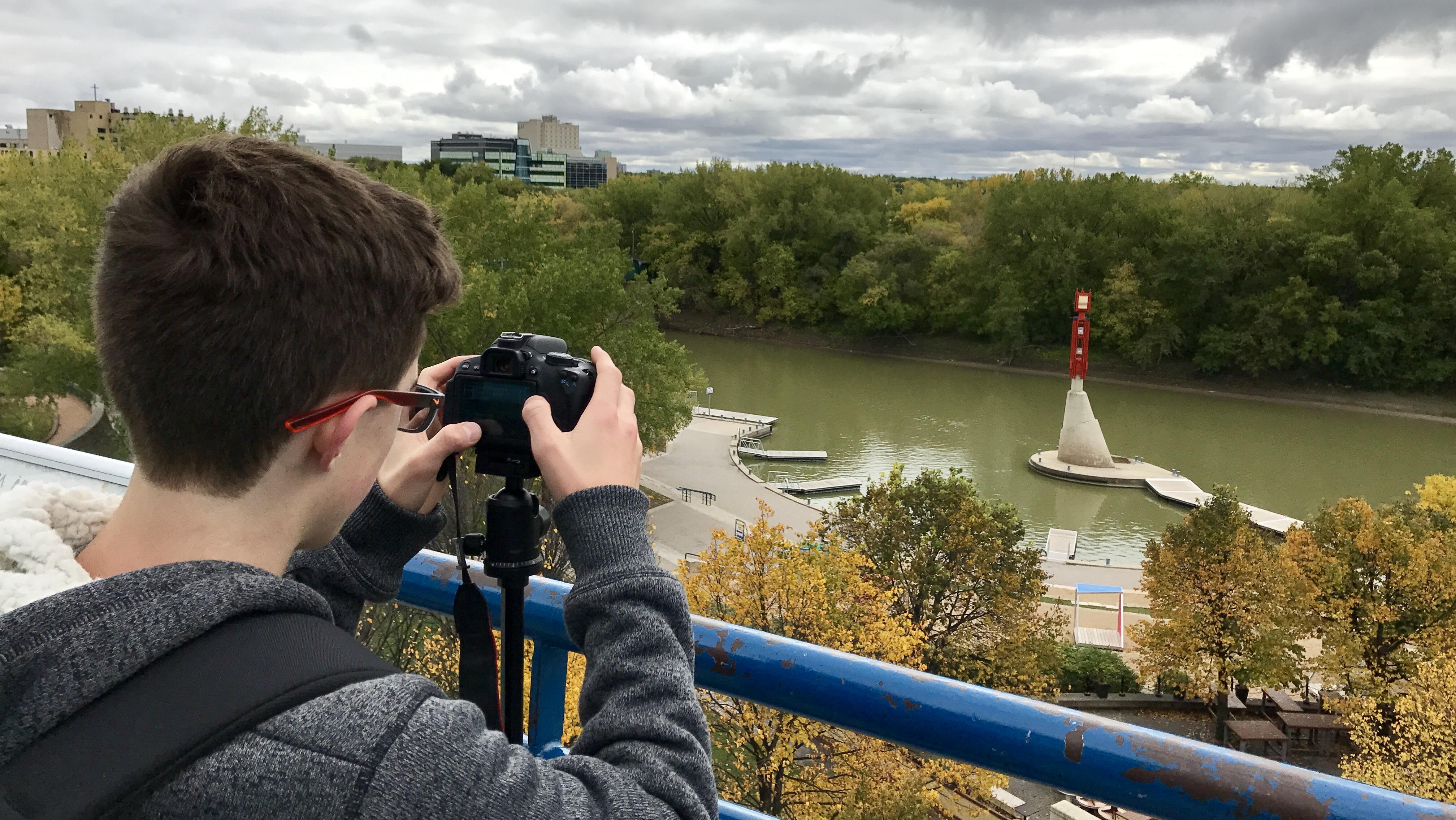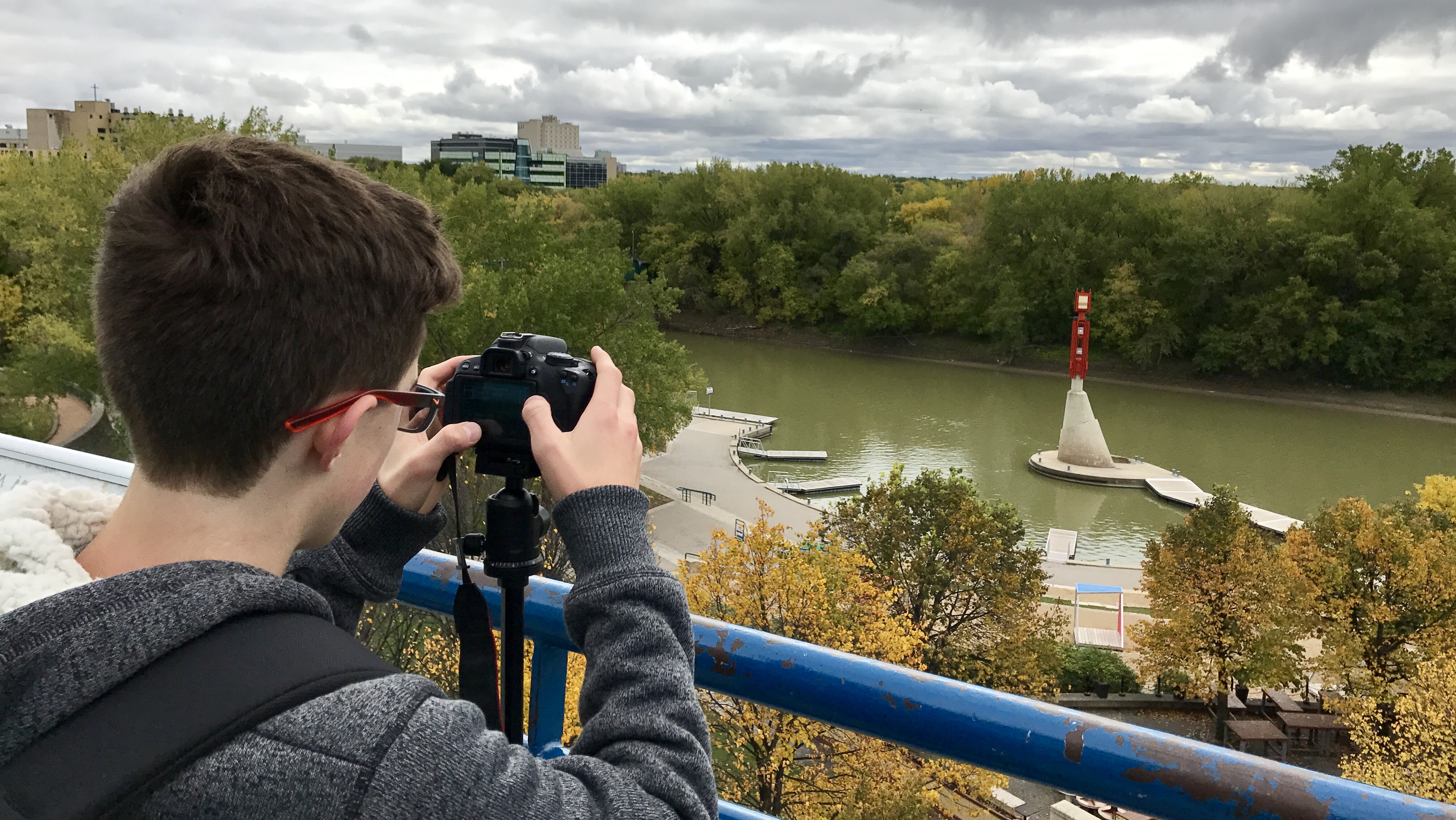Nelson McIntyre Completes Year 3 of Re-imagining High School
 |
In September 2018, Nelson McIntyre Collegiate (NMC) began its third year of re-imagining as part of a four-year plan for implementation. Empowered by two successful years of Grade 9 and 10, 2018-2019 focused on completing our vision for Grades 11 and 12. We launched a new "Flex Mod" Schedule and a new system of Physical Education in Grade 11 & 12, and introduced an English Language Arts/History cross discipline class. Furthermore, all students participated in our Weeks without Walls initiative, and all our Grade 9 classes, our Precalculus and Applied Maths classes ran through a self-paced, mastery approach. This year culminated in our Physical Education Team winning the PHE Innovator's Award, our Math Team winning the Manitoba's Excellence in Education Award for Outstanding Team Collaboration and Mr. Greg Speiser winning the Prime Minister's Award for Teaching Excellence. Designed through research, school visitations, and a collaborative teaching team, Nelson McIntyre implemented the third year of its plan to increase academic achievement and engagement through an approach to learning that insists on active participation, authenticity, student voice and choice, and continual reflection and revision. NMCs pillars for this model are Academic Rigor with a focus on Mastery and Independence (Content Knowledge and Deep Understanding; Literacy and Numeracy Focus), Skill Building (the 6Cs—Communication, Critical Thinking, Collaboration, Creativity, Citizenship, and Character), and Forging Identity (focus on student choice and voice, finding passions and interests, and career development). Working to connect students to community and each other, and to develop compassion for others are other key components to our programming. Flex Mod ScheduleOur new schedule provided flexibility for our students and teachers. Instead of having every class for the same length, courses were scheduled according to what made sense for the discipline. For example, running math daily for consistent amounts of time made sense for those courses, but running longer classes in industrial arts allowed students to spend more time working and less time with daily clean-up. Similarly, Foods and Nutrition classes with longer time frames on cooking days allowed the students to make things that simply could be made in an hour. This schedule also came with "Flexing Out" and "Call Backs". Students could be flexed out if all their work was completed, and they were simply "killing time", allowing them to work on other things. Call backs were used to provide extra time for students who needed support. This new schedule supported our attempt to help students see school as part of "real world planning". They needed to plan their flex time (any unscheduled time) differently as their class times changed daily. They also could see the value in working more efficiently, as they were not longer "trapped by the bell". Learning is the focus rather than time with this approach. Furthermore, we eliminated bells indicating class changes in the school as courses could end at different 20-minute increments. This change has required everyone to attend to time differently and has created a sense of peace in the building as students are rarely moving on mass. Generosity and BelongingAt the Mac, we take pride in the sense of belonging we create. We work hard to transition new students to our building, and to help our students find their place here. Structures that support this sense of belonging are our interdisciplinary classes, where students spend the whole year with the same teacher over 4 subjects in Grade 9 and 10, our Teacher Advisory System, where teachers work with students to set goals and review their results, and the myriad of opportunities and connections we provide our students while they are with us. We also value student voice. We ask for their feedback continually and use it in our planning. We seek their advice on new programming, on new ideas, and on new opportunities, and we look for ways to use their ideas for multiple purposes. Giving student voice, gives them a sense of purpose and increases their sense of belonging. We work to get to know our students and their interests so that we can tailor ideas, lessons, Weeks without Walls, or programming for them. In our survey last year, students indicated that 77% indicate that they feel that they can be themselves and 75% say that they are learning more about themselves through Weeks Without Walls and coursework. This is an area where we will continue to seek improvement. Additionally, we recognize that peer relationships assist in increasing our students' sense of belonging. Last year, we began to work more explicitly to develop students' collaboration skills. We see this as an opportunity to model generosity—when we are truly collaborative, we value others' opinions, we invite discussion, we embrace differences, and we work together. Allowing others to shine is an opportunity to express generosity. These skills in collaboration do not come naturally, and we are working to enhance and strengthen them in our students. Additionally, we enjoy a number of different opportunities to express generosity from our school wide Day of Giving to our Seniors Matinee to our requirement for Volunteer contributions from our Grade 11 and 12s, and we continue to search for new ways to encourage and model generosity. Mastery and IndependenceCompulsory Courses Last year, we added a cross-discipline blend of ELA and History to our grade 11 model in addition to the Grade 9 and 10 cross-discipline model. Students in all grades connect subjects through inquiry projects that culminate in some sort of public product or performance. Because of this approach
Grade 9 and 10 students spent their afternoons working on English Language Arts, Social Studies/Geography, Science and Technology through interdisciplinary projects. These projects involve deep inquiry, connection to community, relevance to students, where student voice and choice are important, and where student work has an authentic purpose and audience. In Grade 10, increased opportunities for Student Voice and Choice occurred from determining groups size and members, to deciding on the type of product or performance and the appropriate audience for it. Integration of Geography and Science curriculums allowed students to have a deeper understanding of both of those content areas. In Grade 11, History and English Language Arts are combined for Interdisciplinary coursework as sciences have become electives. These courses work to expand students critical thinking skills, to help them make connections, to build historical literacy skills as well as traditional literacy skills. Students learn research and inquiry skills and routinely present to outside audiences. We continued to focus on Literacy Skills. Through this shift in our learning model, we have seen a growth in reading, writing, and public speaking, in particular. Because of the year-long nature of the work, opportunities for reading, as well as authentic opportunities to write and present to public audiences, allowed for growth we have not seen in the past. Teachers used Penny Kittle's work to guide their reading and writing practices, and modelled many of their presentation ideas on Propel (our one semester PBL learning for Grade 11 students from across the division). Physical EducationIn Grade 11 and 12, our PE teachers developed a model that allows the students much greater choice in their pursuit of physical activity. This model allows students to take PE all year, choosing blocks of instrument throughout the year. Additionally, we have developed a flexible model that allows students to take PE where ever it fits in their schedule rather than forcing them into one block in the day. This flexible had benefits outside Physical Health. It requires that students plan, set goals, and adjust them as necessary—an important life skill. As a result of this new model we have seen a higher engagement level through participation and attendance. MathematicsLast year, our Mathematics department continued to develop its self-paced individualized path for our students in Mathematics to help students overcome frustration and learn math to a mastery level. This system for math ensured that students understood a concept before proceeding. As a result, students were no longer bored waiting for others to catch up, nor were they lost from being left behind. This method occurred in all Grade 9, and Grade 10 -12 Pre-calculus and Applied streams for math. Additionally, the team began development of self paced sections of the essentials stream for math as well as Project-based approaches for units where this approach makes sense. Weeks without WallsIn 2018-2019, we added our all four grades into our Weeks without Walls initiative. This was a tremendous undertaking as we essentially doubled the number of themes for our whole school population. The purpose of this initiative is to help students discover interests and careers/jobs they didn't know existed, to help them find their strengths and areas of passion and to help them envision a future for themselves. For our Grade 11s and 12s we worked to create more student driven weeks, with more focus and rigor to match their levels of interest and maturity. Our intention is that by the end of Grade 12 students will have a strong sense of themselves and possible career paths; knowing their own strengths and interests, having a sense of the job market, and how those strengths and interests connect to future careers. Propel is an elective approach for Nelson McIntyre Collegiate students. Students from our school join others from across the division to take a "deep-dive" into an area of passion and interest while gaining credits in ELA, IT, and Career Development. Since it's beginning in 2015-2016, we have had 8 semesters of student success. Enrollment in the program has increased by 25%, and more students than we can accommodate express interest in taking this immersive opportunity for learning. Last year, we worked to connect with Alumni to understand Propel's influence in their post high school life. Students with whom we connected are currently working and studying all over North America. From working at Google, to Marketing at Skip the Dishes, from studying Engineering at U of M to Studying Music in Toronto, students agreed that Propel gave them an advantage in the following areas:
The sheer volume of media that this program elicits is representative of its success. Indicators of SuccessTo determine our success, we used attendance data, student formal feedback from school surveys and Tell Them from Me survey, as well as qualitative feedback from parents, the community and our partners. We know that engagement has improved as
We also know that our achievement data has improved as
We continue to receive anecdotal feedback from community members about the uniqueness in skill and attitude from our students. Instructors from the St. Boniface Youth Bio-Lab indicate that our students exceed others in their ability to collaborate, problem-solve and persevere through difficult problems. Community instructors and facilitators from our Weeks without Walls programs indicate that our students are exceptionally, engaged, polite, and able to ask thoughtful questions in ways they haven't seen before. Experts from The Forks and City Planning regularly remark on the exceptional quality of thinking and public speaking skills in our students. Our third year of implementation continues to reflect success. As we move forward into our final year of implementation, we look forward to the Grade 12 cross-discipline studies in ELA and Global Issues, more elective opportunities for our students, and greater focus on Career Development. Additionally, the addition of Student Run cafeteria as an entrepreneurial venture has begun to create excitement. Finally, we are looking forward to planning for new infrastructure at NMC with the development of our "backyard" as a place of learning. |

